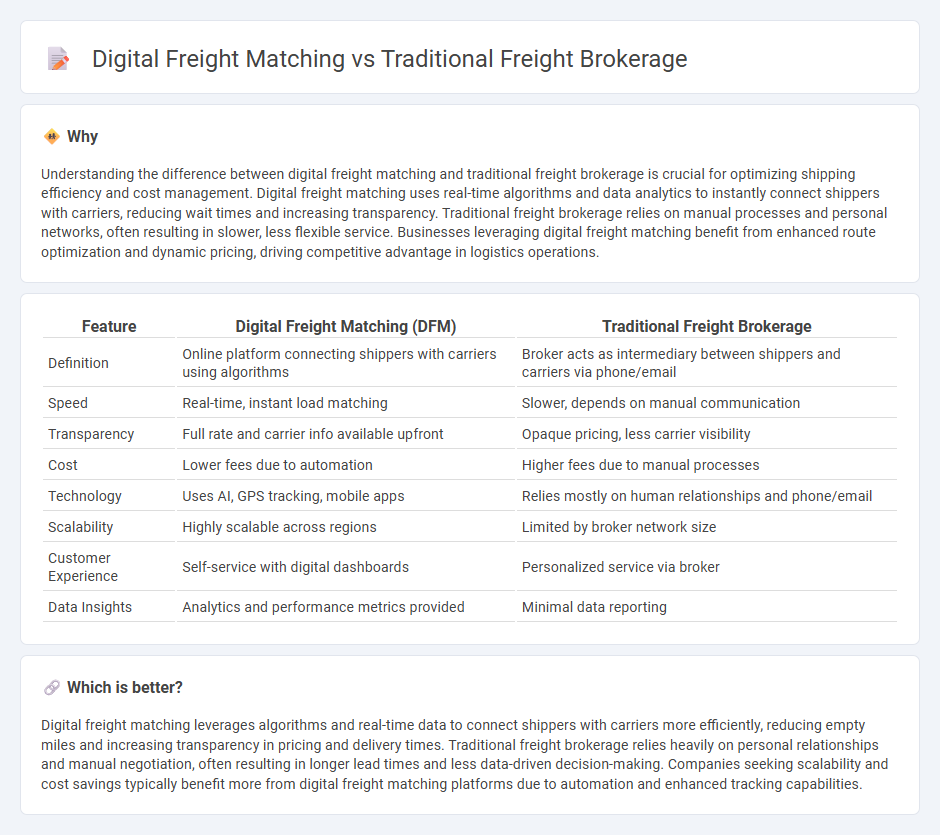
Digital freight matching leverages advanced algorithms and real-time data to connect shippers with carriers instantly, enhancing efficiency and transparency in logistics operations. Traditional freight brokerage relies on manual processes and personal networks, often resulting in slower response times and limited load visibility. Explore how the transformation from traditional methods to digital platforms is revolutionizing freight management.
Why it is important
Understanding the difference between digital freight matching and traditional freight brokerage is crucial for optimizing shipping efficiency and cost management. Digital freight matching uses real-time algorithms and data analytics to instantly connect shippers with carriers, reducing wait times and increasing transparency. Traditional freight brokerage relies on manual processes and personal networks, often resulting in slower, less flexible service. Businesses leveraging digital freight matching benefit from enhanced route optimization and dynamic pricing, driving competitive advantage in logistics operations.
Comparison Table
| Feature | Digital Freight Matching (DFM) | Traditional Freight Brokerage |
|---|---|---|
| Definition | Online platform connecting shippers with carriers using algorithms | Broker acts as intermediary between shippers and carriers via phone/email |
| Speed | Real-time, instant load matching | Slower, depends on manual communication |
| Transparency | Full rate and carrier info available upfront | Opaque pricing, less carrier visibility |
| Cost | Lower fees due to automation | Higher fees due to manual processes |
| Technology | Uses AI, GPS tracking, mobile apps | Relies mostly on human relationships and phone/email |
| Scalability | Highly scalable across regions | Limited by broker network size |
| Customer Experience | Self-service with digital dashboards | Personalized service via broker |
| Data Insights | Analytics and performance metrics provided | Minimal data reporting |
Which is better?
Digital freight matching leverages algorithms and real-time data to connect shippers with carriers more efficiently, reducing empty miles and increasing transparency in pricing and delivery times. Traditional freight brokerage relies heavily on personal relationships and manual negotiation, often resulting in longer lead times and less data-driven decision-making. Companies seeking scalability and cost savings typically benefit more from digital freight matching platforms due to automation and enhanced tracking capabilities.
Connection
Digital freight matching platforms enhance traditional freight brokerage by using advanced algorithms and real-time data to connect shippers with carriers more efficiently. They streamline the booking process, reduce empty miles, and improve load optimization by leveraging AI-driven insights. This integration boosts overall supply chain visibility while maintaining the personalized service brokers provide.
Key Terms
Traditional Freight Brokerage:
Traditional freight brokerage relies on established relationships and personalized negotiations between shippers and carriers, often involving manual processes such as phone calls and paperwork. This method ensures customized service and trusted partnerships but can lead to slower response times and less transparency. Explore how traditional freight brokerage balances reliability with efficiency in modern shipping solutions.
Manual Load Booking
Traditional freight brokerage relies heavily on manual load booking processes involving phone calls, emails, and paperwork, leading to slower transaction times and increased risk of human error. Digital freight matching platforms automate load booking through real-time data integration, enabling faster carrier matching and streamlined communication. Explore the benefits of digital freight matching for enhancing operational efficiency and reducing delays.
Relationship Management
Traditional freight brokerage emphasizes personalized relationship management through direct communication and established trust with carriers and shippers, often resulting in long-term partnerships. Digital freight matching leverages advanced algorithms and real-time data to streamline capacity matching but may lack the depth of human interaction crucial for nuanced negotiation and problem-solving. Explore how integrating both approaches can enhance efficiency and strengthen industry relationships.
Source and External Links
Different Types of Freight Brokers: Pros & Cons - Traditional freight brokers are industry veterans with strong carrier networks who provide full-service solutions, handling everything from carrier sourcing to paperwork and shipment tracking, but their services often come at higher fees and may prioritize larger shipments.
What is a Freight Broker? (Their Role within Shipping) - MSC - A traditional freight brokerage typically employs specialized sales and carrier teams to connect shippers with carriers and manage freight logistics but does not own transportation assets, which can limit guaranteed capacity.
What Are the Different Types of Freight Brokers? - Traditional freight brokerage companies employ workers on salary and commission and have established processes, offering dependable services shaped by years of industry experience since at least 1989.
 dowidth.com
dowidth.com